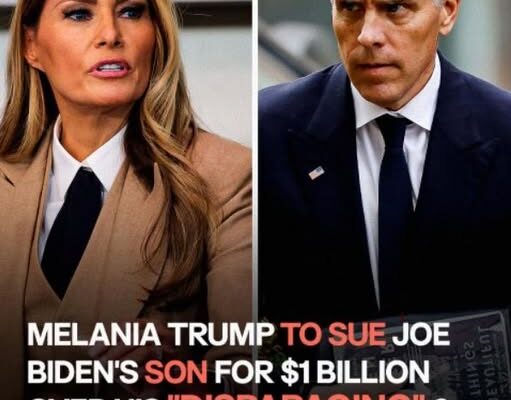In August 2025, a legal confrontation between First Lady Melania Trump and Hunter Biden captured national attention, centering on comments Biden made during an interview with journalist Andrew Callaghan. During the interview, Biden alleged that convicted sex offender Jeffrey Epstein had introduced Melania to Donald Trump. This claim directly contradicted Melania Trump’s account in her 2024 memoir, in which she stated that she met Donald Trump at a 1998 Fashion Week party in New York City organized by modeling agent Paolo Zampolli, not Epstein. This discrepancy set the stage for a high-profile defamation dispute that quickly drew both media and public scrutiny.
On August 6, 2025, Melania’s attorney, Alejandro Brito, issued a cease-and-desist letter to Hunter Biden demanding an immediate retraction and apology. The letter described Biden’s statements as “false, defamatory, disparaging, and inflammatory,” asserting that they caused substantial financial and reputational harm to Melania. Brito also warned that if Biden failed to comply by August 7, Melania would pursue legal action seeking over $1 billion in damages. This legal threat was consistent with previous actions taken by Melania’s legal team against public figures who had propagated the narrative linking her to Epstein. Notably, political analyst James Carville issued an apology and retracted his statements following intervention from Melania’s lawyers, and The Daily Beast removed an article by biographer Michael Wolff that had made similar claims.
Hunter Biden responded defiantly to Melania Trump’s legal threat. In a subsequent interview with Callaghan, Biden used explicit language to dismiss the lawsuit, stating, “F*** that! That’s not going to happen.” He further challenged the Trumps to undergo depositions to clarify their connections to Epstein, framing the legal action as an attempt to divert attention from more complex issues. Biden’s combative stance highlighted the tension between the two families and the polarizing nature of public statements involving high-profile political figures.
The dispute carries clear political implications, with President Donald Trump publicly supporting his wife’s legal stance. He confirmed that he encouraged Melania to pursue the lawsuit and offered his legal resources to assist her. Trump criticized Hunter Biden for repeating unfounded claims and suggested that the legal action would provide an opportunity to scrutinize Biden’s own connections to Epstein. The situation thus not only involves questions of defamation and personal reputation but also intersects with ongoing political narratives and rivalries.
Melania Trump’s legal action highlights the difficulties public figures face when trying to protect their reputations in the modern media landscape. Allegations involving a figure as controversial and widely reported as Jeffrey Epstein are quickly amplified through media channels, social media platforms, and public discourse. Even a single public statement, whether true or false, can have lasting repercussions for the individuals involved. The legal threat issued by Melania demonstrates a strategic attempt to assert control over her personal narrative and push back against claims she regards as both false and damaging.
The interaction also reflects broader dynamics of defamation law in cases involving public figures. For a public figure to succeed in a defamation lawsuit, the burden of proof is high. They must demonstrate that false statements were made with actual malice, meaning the speaker either knew the statements were false or acted with reckless disregard for the truth. In this case, Melania Trump’s legal team argues that Hunter Biden’s statements meet these criteria, citing the direct conflict with her previously published memoir and other corroborated accounts of her meeting with Donald Trump.
The public’s response to the dispute has been varied. Supporters of the Trump family have framed the lawsuit as a necessary defense of truth and personal integrity, emphasizing the importance of holding public figures accountable for spreading false information. Conversely, critics have portrayed Hunter Biden’s defiance as a stand against intimidation, suggesting that the legal threat is politically motivated and intended to suppress debate or investigation into broader matters connected to Epstein. The clash between these narratives illustrates how public opinion can further complicate legal disputes involving high-profile figures.
This confrontation also underscores the enduring influence of Jeffrey Epstein’s legacy on American political and social discourse. Allegations linking Epstein to prominent figures remain potent, and even unverified claims can generate significant legal, social, and political consequences. For Melania Trump, the lawsuit represents an effort to delineate fact from fiction, reinforce her personal narrative, and prevent the spread of statements she considers damaging. For Hunter Biden, the dispute offers a platform to challenge both the allegations and the perceived attempt to stifle discussion.
The broader context of the Trump-Biden rivalry intensifies the significance of the dispute. Both families have been central to American politics for decades, and public disputes between members are inevitably magnified by media coverage and public interest. The legal confrontation over alleged Epstein connections is not merely a private matter but is entwined with questions of political credibility, public perception, and ongoing partisan tensions. The high stakes and public visibility ensure that the case will continue to attract scrutiny as it develops.
As the legal proceedings unfold, they may set important precedents for defamation cases involving public figures. The combination of personal reputation, political implications, and widely disseminated allegations challenges courts to balance free speech protections with protections against demonstrably false statements. Melania Trump’s case against Hunter Biden could provide insight into how courts approach disputes where both parties are high-profile individuals and where the public interest in the subject matter is significant.
Ultimately, the confrontation between Melania Trump and Hunter Biden serves as a microcosm of the modern intersection of personal reputation, media amplification, and political rivalry. It illustrates how statements made in public forums can quickly escalate into legal action, particularly when they touch on sensitive or controversial topics. The case also demonstrates the strategies public figures use to defend their reputations and the complex interplay between legal, social, and political factors in high-profile disputes. As developments continue, observers will watch not only the legal outcomes but also the broader implications for public discourse and the protection of personal and professional integrity in an era of intense media scrutiny.
The Melania Trump-Hunter Biden legal confrontation exemplifies the challenges of navigating truth, perception, and accountability in a highly politicized and media-driven environment. The outcome of this case could influence how public figures respond to allegations, the effectiveness of legal threats in curbing misinformation, and the boundaries of free speech versus reputational protection. Regardless of the resolution, the dispute underscores the lasting impact of public statements on personal and political legacies, highlighting the complex and often contentious world in which high-profile individuals operate.
This dispute remains a developing story, with both legal and public relations strategies in play. It illustrates the intricate relationship between personal narratives, media coverage, and legal recourse. As Melania Trump seeks to defend her reputation and Hunter Biden challenges the claims, the broader public will continue to follow the case as it unfolds, reflecting the enduring fascination with the intersections of politics, fame, and accountability.
The clash over Epstein allegations not only brings attention to the individuals directly involved but also raises broader questions about responsibility, truth, and the mechanisms available for addressing defamation in the modern age. By asserting her right to protect her reputation through legal means, Melania Trump is asserting the importance of factual accuracy in public discourse, while Hunter Biden’s defiant response underscores ongoing tensions between public figures and the boundaries of accountability. The legal and political outcomes of this confrontation will likely reverberate well beyond the immediate dispute, influencing how similar cases are approached and perceived in the future.
This episode marks another chapter in the ongoing saga of Trump-Biden interactions, where personal, political, and legal conflicts intersect. The case demonstrates how defamation claims, especially when intertwined with controversial historical figures like Jeffrey Epstein, can quickly become matters of national interest. As both sides continue to navigate this high-stakes situation, the balance between free expression, personal integrity, and political maneuvering will remain at the forefront of public and legal scrutiny.
In conclusion, the legal battle between Melania Trump and Hunter Biden over the alleged Epstein connection represents a multifaceted dispute involving personal reputation, political rivalry, and public perception. It exemplifies the complexities faced by public figures in defending themselves against statements they consider false and damaging. The case’s resolution will have implications not only for the parties directly involved but also for broader societal conversations about accountability, media influence, and the legal protections available to those in the public eye.



